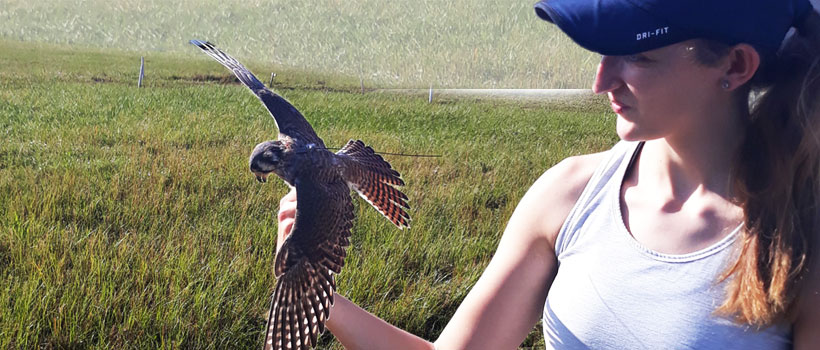
Mercy Melo ’21 takes her undergraduate research to new heights.
Biology major, Mercedes (Mercy) Melo ’21 of Lehighton, PA, chose Cedar Crest College because of the small class sizes, ability to work one-on-one with professors in a hands-on environment and ample opportunities for undergraduate research. In her first year, she took the opportunity to conduct independent research and it shaped both her Cedar Crest experience and post-graduation plans.
Through a collaboration with Hawk Mountain Sanctuary in Kempton, PA, Melo conducted research on the American kestrel, the smallest and most common falcon in North America. “Many other institutions only have research opportunities for upperclassmen, so being able to begin learning how to conduct research so early allowed me to be extremely well prepared for my career after undergrad,” Melo says. Since graduating in January 2021, Melo conducts research full-time working as a field technician at Hawk Mountain. She is collecting data for her Ph.D. research project, an expansion of her undergraduate research on American kestrels.
“My first-year research experience jump-started my passion for conducting biological research and ultimately led me to the career path I am on today,” says Melo.
Melo plans to attend the University of Massachusetts Amherst this fall to pursue her Ph.D. in environmental conservation with a concentration in wildlife, fisheries and conservation biology. Her new research project connects nine kestrel nest-box programs in five different states to investigate how populations of kestrels in different regions may be facing different challenges that are leading to declines. “This collaborative approach not only helps gather data on a variety of populations but has also provided me with numerous connections to ecologists and biological researchers across the Northeastern United States,” Melo adds.
The goal of her research is to determine why American kestrel populations are declining. “My favorite thing about my current research is that it is so multifaceted,” she says. “There are so many angles to look at the issue from. It’s such a puzzle to me, and I love putting together the different pieces to try to see the story they’re telling us.” Melo worked alongside Cedar Crest faculty members in the biological sciences department, including Allison Cornell, Ph.D., now an assistant professor at Penn State Altoona.
As a junior, Melo was awarded a research grant from TriBeta to support her project entitled “Gastrointestinal microbiome biodiversity in developing American kestrel chicks.” Her research explored how bacteria living in the gut of wild birds changes during chick development. She used the funds to purchase supplies and travel to a sequencing facility at Cornell University. The project was supervised by Allison Cornell and co-supervised by Jenn Houtz at Cornell University and JF Therrien, Ph.D., of Hawk Mountain Sanctuary.
In January 2021, Melo and biology major Courtney Zimmerman ’22 were authors with Cornell and Therrien on a research article published in Physiological and Biochemical Zoology. The paper documents individual variation in American kestrel chick development. The students contributed to data collection in the field, lab work, preliminary data analysis and writing the paper.
“Being able to work with a phenomenal principal investigator and many other faculty members in the biological sciences department provided me with a breadth of knowledge and a great pool of connections for my time after Cedar Crest,” says Melo.
When considering her career journey ahead, Melo plans to continue conducting field research. “At this point, I’m not sure if that will come from a professor position (or other affiliation with academia) or if I will end up doing research full-time with a nonprofit or government agency,” she adds. Through her kestrel project, Melo collaborated with professors, game commission researchers, state ornithologists and biologists involved in nonprofits—providing her the opportunity to explore the possibilities of each career path.